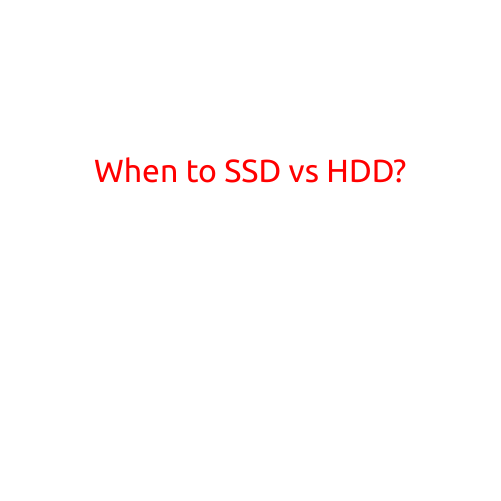
When to SSD vs HDD?
When it comes to choosing a storage device for your computer or laptop, you’re likely faced with the decision between two popular options: Solid-State Drives (SSDs) and Hard-Disk Drives (HDDs). Both types of storage devices have their own strengths and weaknesses, making it essential to understand when to choose one over the other.
What are SSDs and HDDs?
Before we dive into the decision-making process, let’s quickly describe what SSDs and HDDs are.
SSDs (Solid-State Drives)
SSDs are storage devices that use flash memory to store data. They are designed to provide faster access times and higher performance compared to traditional hard-disk drives. SSDs don’t have moving parts, which makes them more durable and resistant to wear and tear.
HDDs (Hard-Disk Drives)
HDDs, on the other hand, use spinning disks and mechanical heads to read and write data. They are less expensive than SSDs and offer higher storage capacities.
When to Choose SSDs:
- Performance-critical applications: If you’re a gamer, video editor, or graphic designer, SSDs are an excellent choice. They provide faster loading times, faster data transfer rates, and improved responsiveness.
- Frequent multitasking: If you have multiple applications open simultaneously, an SSD can help keep your computer running smoothly. SSDs enable faster switching between applications and reduce lag.
- Low storage needs: If you only store a small amount of data, such as a few applications and files, an SSD might be sufficient. You can opt for a smaller SSD storage capacity.
- Urgent file access: If you need to access files quickly, an SSD provides faster read and write speeds.
When to Choose HDDs:
- Large storage needs: HDDs offer higher storage capacities at a lower cost per gigabyte. If you need to store a vast amount of data, such as movies, music, or files, an HDD is a better choice.
- Cost-effective storage: If budget is a concern, HDDs are generally cheaper than SSDs with similar storage capacities.
- Data archiving: HDDs are suitable for storing large amounts of data that don’t require frequent access.
Hybrid Approach:
A hybrid approach is also possible, where you combine an SSD with an HDD. This setup allows you to have a fast SSD for your operating system, applications, and frequently accessed files, while storing larger files and data on the HDD.
Conclusion:
When deciding between SSDs and HDDs, consider the specific requirements of your computer or laptop usage. If you prioritize performance, multitasking, and fast file access, an SSD might be the better choice. However, if you need large storage capacities and are on a budget, an HDD is an excellent option. By understanding the strengths and weaknesses of each storage device, you can make an informed decision that meets your needs.
Final Thoughts:
In the end, the best storage solution depends on your specific needs and preferences. Remember to consider factors such as storage capacity, price, and performance when making your decision.





